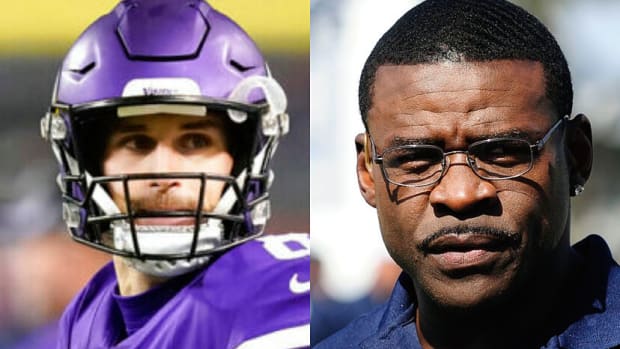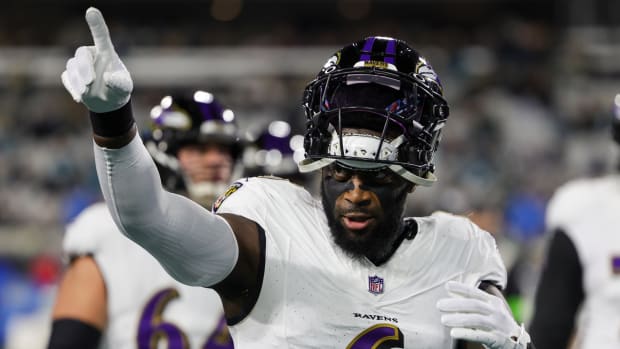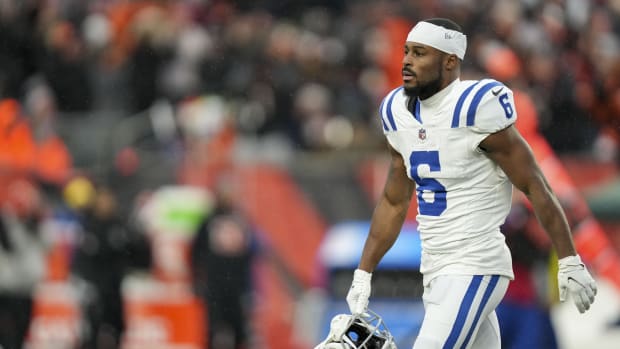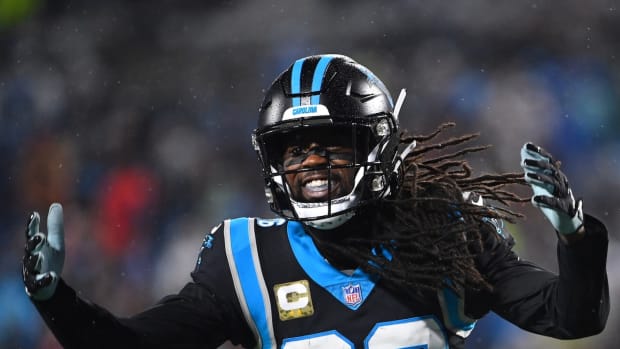Maybe ‘Dilly Dilly’ Is What America Needs in 2018
Sportsbooks wanted in on the action. A day after the Eagles and Patriots clinched Super Bowl berths, offshore gambling house BetDSI posted a light-hearted wager: Would the world “Dilly” be heard on the Super Bowl broadcast over or under 12.5 times? BetDSI is based in Costa Rica, so maybe its linesmakers weren’t as familiar with the ads, the memes, the signs, the shirts, the silliness that surround Bud Light’s recent catchphrase. Bettors were not fooled. “We were getting hammered on the over, so we pulled it off the board,” a spokesman said. Dilly Dilly!
Wednesday, Patriots wideout Kenny Britt was grilled about his acrimonious time in Cleveland—“Dilly Dilly. That’s my response.” That evening, Ian Eagle was calling a Brooklyn Nets home game when guard Spencer Dinwiddie cut to the basketball and finished a layup despite contact—“A Dilly Dilly for Dinwiddie!” Where did the idea come from? “As ‘Dilly Dilly’ has entered the pop culture lexicon, it’s hard to miss,” Eagle told The MMQB, saying he was struck by the similarities between the expression and the name of Brooklyn’s starting PG. “It’s not much deeper than that.”
Hard to miss, indeed. The pithy epizeuxis debuted in August and has spread across the lips of American masses. It was briefly listed as the official motto for Ames, Iowa, on Wikipedia. It’s been used as a sign-off after airplane security announcements and a welcome call by the Colorado House Minority Leader. “Dilly Dilly” has also been espoused as a popular rallying cry by so-called HQties on the ephemeral mobile game show HQ Trivia. (What an absurd sentence, Dilly Dilly!)
The growth and growth and growth of the nonsense saying raises two questions: 1) Why? 2) No, really, what the Dilly Dilly is going on here?
It all goes back to a creative session Bud Light marketing execs held with ad agency Wieden Kennedy before the football season. Bud Light marketing lead Andy Goeler says he was intrigued by the Game of Thrones setting of the pitch (GoT’s most recent season concluded the day Bud debuted its “Banquet” ad). The idea of someone bringing “honey mead wine” to a medieval soirée and getting sent to the “Pit of Misery” aligned with the brand’s message that good friends bring beer—“and then, Dilly Dilly,” Goeler says. The story behind that specific phrase is simple: It made WK art director NJ Placentra and copywriter Alex Ledford laugh as they bounced ideas off each other.
In response to positive early returns, the company ordered another spot, this time based around a dungeon scene, but otherwise decided to go hands-off with its brainchild. Goeler denied requests from local distributors who wanted “Dilly Dilly” signs and sat on his hands rather than plastering one of the company’s most successful recent campaigns on every billboard he could. He wanted the idea to grow organically with as little corporate contamination as possible. He’s glad he did.
Goeler was watching Thursday Night Football in his Manhattan apartment in November when Ben Roethlisberger stood in shotgun, yelling Turbo … Turbo … Pounce … Dilly Dilly! “I fell off the couch,” Goeler says. That was one of many inflection points this fall, as he puts it. “It just permeated culture.” The team continued its cautious approach, watching as third-party vendors created “Dilly Dilly” T-shirts and Eagles fans came up with their own “Philly Philly” spin off. In the meantime, Bud Light has seen a 14% uptick in brand sentiment and a doubling in social media mentions. Goeler thinks letting fans own the phrase in that way has been key to its success, as is the fact that it’s simply something fun to say in a moment dominated by negativity.
Not a concrete enough reason for you? Still perplexed by the Dillyfication of American sports? Well let’s turn from the beer bellies to the eggheads. Jefferson Barlew has a Ph.D. in linguistics and currently lectures at Ohio State on how language intersects with advertising. So obviously he was happy to expound on a 30-second commercial for 30 minutes.
You have to take into account sound symbolism, he says, the neurological theory that when we hear a word like dilly, our brain partly hears silly, belly, and willy—all words that are also fun in their own respect. That’s one of the three similarities Barlew sees between the new ads and the company’s famous “Wazzup” campaign, which he teaches in his class. Second, there is ample opportunity to use either saying in normal conversation, powering their spread. Third, they both developed social meaning.
Here’s what that means: There are words we use to identify with those like us, to create a sense of community in groups, occasionally at the expense of those not in the know. Maybe that’s what one student was going for when he hoisted a “Dilly Dilly” sign up during College GameDay, strengthening connection with like-minded bros.
And the decision to go light on aggressive targeted marketing tactics has benefits beyond seeming less corporate, Barlew says. Bud Light is able to pack more context into a TV commercial than they could in a billboard ad or sponsored tweet, helping to endow the made-up phrase with meaning upon first exposure. More than that, by allowing the phrase to be twisted however people want to twist it—“We’re not defining it. We’re letting you define it,” Goeler said in November—he also let language do its thing. “Language evolves where it wants to go,” Barlew says. Maybe American English in 2018 needed “Dilly Dilly.”
As Bud Light and Wieden planned their 90 seconds of Super Bowl time, there was little debate. They decided to go even bigger with the campaign, shooting in New Zealand, picking a landscape that Lord of the Rings had set itself in 15 years earlier. They introduced Bud Knight (a concept that admittedly made me giggle), and yes, there’s a dragon. After that, who knows. “We don’t want to overstay our welcome,” creative director Brandon Henderson says.
Then again, as Goeler says, “‘Game of Thrones’ has lasted for seven years.”
Question or comment? Email us at dilly.dilly@themmqb.com.






































